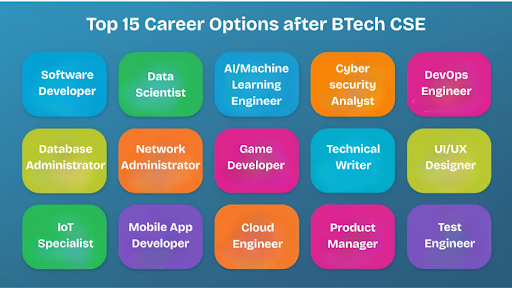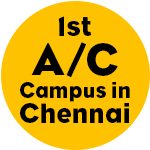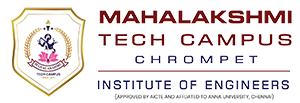 If you are confused or curious about what to do after studying BTech CSE, there are plenty of career opportunities that you can opt for. By the end of the academics, most computer science engineering students will gain a self-awareness which can help them to choose the suitable career. Students must select a career based on their preferences and expertise to make it a long-term endeavour. The most chosen career options after BTech CSE are Software
If you are confused or curious about what to do after studying BTech CSE, there are plenty of career opportunities that you can opt for. By the end of the academics, most computer science engineering students will gain a self-awareness which can help them to choose the suitable career. Students must select a career based on their preferences and expertise to make it a long-term endeavour. The most chosen career options after BTech CSE are Software
Developer, Data Scientist, AI/Machine Learning Engineer, Cybersecurity Analyst, DevOps Engineer. You can also pursue higher education or research or join government jobs via competitive exams. In this blog, we are going to present a list of career options after BTech CSE, where you can choose the one.
Computer Science & Engineering (CSE) Program – A Brief Look
The CSE program combines core subjects like programming, algorithms, data structures, databases, operating systems, networking, artificial intelligence, and cybersecurity. These subjects build a strong foundation in problem-solving and technology development. With this knowledge, CSE graduates can design innovative software, secure digital systems, analyze big data, and create intelligent solutions. Ultimately, the program empowers students to contribute to global progress by improving communication, healthcare, business efficiency, and everyday life through technology. The skills and improvements it entails allows the CSE students to have more career opportunities in their field.
Best 15 Career Options after BTech CSE
As we discussed, a career must be chosen based on one’s preferences, skills and talents. For instance, if one is interested in coding, they can go for development, and if one is not into coding but interested in a technical field, they can choose testing, support, maintenance, or even technical writing, if one likes to write. In the following, we have given the list of best 15 career options, which can help you to choose one:

1. Software Developer
 If you enjoy problem-solving and building digital solutions, a career as a Software Developer could be ideal. This role involves designing, coding, and maintaining software applications using languages like Java, Python, and C++. In India, software developers are in high demand across IT services, startups, and multinational companies, with salaries ranging from ₹3 lakh to ₹12 lakh per annum for beginners and mid-level professionals. The work is a blend of logical thinking, creativity, and debugging challenges, and the future looks promising with emerging technologies and startups continuously seeking talented coders.
If you enjoy problem-solving and building digital solutions, a career as a Software Developer could be ideal. This role involves designing, coding, and maintaining software applications using languages like Java, Python, and C++. In India, software developers are in high demand across IT services, startups, and multinational companies, with salaries ranging from ₹3 lakh to ₹12 lakh per annum for beginners and mid-level professionals. The work is a blend of logical thinking, creativity, and debugging challenges, and the future looks promising with emerging technologies and startups continuously seeking talented coders.
2. Data Scientist
 Data scientists are the modern detectives of numbers, turning raw data into meaningful insights. Suitable for those with a knack for statistics, analytics, and programming, this career requires knowledge of Python, R, SQL, and machine learning algorithms. Indian companies across finance, e-commerce, and tech sectors offer lucrative packages, often starting around ₹6 lakh per annum. The role includes analyzing datasets, predicting trends, and helping businesses make informed decisions. With data-driven decision-making on the rise, the scope of this profession is only growing.
Data scientists are the modern detectives of numbers, turning raw data into meaningful insights. Suitable for those with a knack for statistics, analytics, and programming, this career requires knowledge of Python, R, SQL, and machine learning algorithms. Indian companies across finance, e-commerce, and tech sectors offer lucrative packages, often starting around ₹6 lakh per annum. The role includes analyzing datasets, predicting trends, and helping businesses make informed decisions. With data-driven decision-making on the rise, the scope of this profession is only growing.
3. AI/Machine Learning Engineer
 If artificial intelligence fascinates you, and you enjoy experimenting with algorithms, becoming an AI/ML Engineer is rewarding. You’ll design models that enable computers to learn and make predictions, using tools like TensorFlow and PyTorch. Indian tech hubs like Bengaluru, Hyderabad, and Pune offer salaries ranging from ₹7 lakh to ₹20 lakh per annum. This role demands strong mathematics, programming skills, and creativity. With AI adoption expanding across industries, the demand for engineers is set to surge.
If artificial intelligence fascinates you, and you enjoy experimenting with algorithms, becoming an AI/ML Engineer is rewarding. You’ll design models that enable computers to learn and make predictions, using tools like TensorFlow and PyTorch. Indian tech hubs like Bengaluru, Hyderabad, and Pune offer salaries ranging from ₹7 lakh to ₹20 lakh per annum. This role demands strong mathematics, programming skills, and creativity. With AI adoption expanding across industries, the demand for engineers is set to surge.
4. Cybersecurity Analyst
 A Cybersecurity Analyst protects organizations from cyber threats and data breaches. Ideal for those who enjoy problem-solving, risk analysis, and staying one step ahead of hackers, this career requires knowledge of network security, ethical hacking, and incident response. In India, companies are increasingly investing in cybersecurity, offering starting salaries around ₹4 lakh per annum. Daily tasks include monitoring security systems, analyzing vulnerabilities, and implementing protection measures. As digitalization grows, cybersecurity expertise will remain crucial.
A Cybersecurity Analyst protects organizations from cyber threats and data breaches. Ideal for those who enjoy problem-solving, risk analysis, and staying one step ahead of hackers, this career requires knowledge of network security, ethical hacking, and incident response. In India, companies are increasingly investing in cybersecurity, offering starting salaries around ₹4 lakh per annum. Daily tasks include monitoring security systems, analyzing vulnerabilities, and implementing protection measures. As digitalization grows, cybersecurity expertise will remain crucial.
5. DevOps Engineer
 DevOps Engineers bridge development and operations, streamlining software delivery processes. This career suits individuals who love automation, cloud platforms, and teamwork. Key skills include Linux, CI/CD tools, scripting, and cloud services. In India, salaries typically range from ₹5 lakh to ₹15 lakh per annum. Responsibilities involve deploying software, monitoring performance, and optimizing infrastructure. With the IT sector rapidly embracing continuous deployment, DevOps professionals are becoming indispensable.
DevOps Engineers bridge development and operations, streamlining software delivery processes. This career suits individuals who love automation, cloud platforms, and teamwork. Key skills include Linux, CI/CD tools, scripting, and cloud services. In India, salaries typically range from ₹5 lakh to ₹15 lakh per annum. Responsibilities involve deploying software, monitoring performance, and optimizing infrastructure. With the IT sector rapidly embracing continuous deployment, DevOps professionals are becoming indispensable.
6. Database Administrator
 Database Administrators (DBAs) manage and safeguard critical data for organizations. Those who are detail-oriented, analytical, and enjoy working with structured systems are ideal candidates. Skills in SQL, Oracle, and database optimization are essential. Indian companies offer ₹4 lakh to ₹12 lakh per annum for DBAs, depending on experience. The role includes configuring databases, ensuring data integrity, and troubleshooting issues. With data being central to business operations, the demand for skilled DBAs remains steady.
Database Administrators (DBAs) manage and safeguard critical data for organizations. Those who are detail-oriented, analytical, and enjoy working with structured systems are ideal candidates. Skills in SQL, Oracle, and database optimization are essential. Indian companies offer ₹4 lakh to ₹12 lakh per annum for DBAs, depending on experience. The role includes configuring databases, ensuring data integrity, and troubleshooting issues. With data being central to business operations, the demand for skilled DBAs remains steady.
7. Network Administrator
 Network Administrators are responsible for maintaining the backbone of IT infrastructure – networks. Individuals with patience, technical curiosity, and problem-solving skills excel here. Daily tasks involve configuring routers, managing servers, and troubleshooting connectivity issues. Indian IT firms, educational institutions, and telecom companies provide salaries around ₹3 lakh to ₹8 lakh per annum. As organizations rely more on robust networking, skilled administrators will continue to be crucial.
Network Administrators are responsible for maintaining the backbone of IT infrastructure – networks. Individuals with patience, technical curiosity, and problem-solving skills excel here. Daily tasks involve configuring routers, managing servers, and troubleshooting connectivity issues. Indian IT firms, educational institutions, and telecom companies provide salaries around ₹3 lakh to ₹8 lakh per annum. As organizations rely more on robust networking, skilled administrators will continue to be crucial.
8. Game Developer
 For those passionate about gaming and creative storytelling, Game Development combines coding with imagination. This profession requires skills in C++, Unity, Unreal Engine, and graphics design. Indian game studios and freelancing platforms offer packages starting from ₹3 lakh per annum, with scope to grow internationally. Tasks include designing gameplay, coding mechanics, and testing performance. With India’s gaming industry booming, talented developers are in high demand.
For those passionate about gaming and creative storytelling, Game Development combines coding with imagination. This profession requires skills in C++, Unity, Unreal Engine, and graphics design. Indian game studios and freelancing platforms offer packages starting from ₹3 lakh per annum, with scope to grow internationally. Tasks include designing gameplay, coding mechanics, and testing performance. With India’s gaming industry booming, talented developers are in high demand.
9. Technical Writer
 Technical writing suits BTech graduates with strong communication skills who enjoy simplifying complex concepts. Writers create manuals, guides, and documentation for software and hardware products. In India, salaries typically range from ₹3 lakh to ₹8 lakh per annum. Responsibilities include researching, drafting, and editing technical content. As tech adoption rises, clear documentation becomes essential, making this a growing and versatile career path.
Technical writing suits BTech graduates with strong communication skills who enjoy simplifying complex concepts. Writers create manuals, guides, and documentation for software and hardware products. In India, salaries typically range from ₹3 lakh to ₹8 lakh per annum. Responsibilities include researching, drafting, and editing technical content. As tech adoption rises, clear documentation becomes essential, making this a growing and versatile career path.
10. UI/UX Designer
 UI/UX Designers focus on creating intuitive and visually appealing user experiences. Ideal candidates are creative, empathetic, and skilled in design tools like Figma and Adobe XD. Indian startups and product companies offer ₹4 lakh to ₹12 lakh per annum. Designers research user behavior, craft prototypes, and improve interfaces. With the emphasis on customer-centric digital products, UI/UX design is increasingly sought after in India’s IT landscape.
UI/UX Designers focus on creating intuitive and visually appealing user experiences. Ideal candidates are creative, empathetic, and skilled in design tools like Figma and Adobe XD. Indian startups and product companies offer ₹4 lakh to ₹12 lakh per annum. Designers research user behavior, craft prototypes, and improve interfaces. With the emphasis on customer-centric digital products, UI/UX design is increasingly sought after in India’s IT landscape.
11. IoT Specialist
 Internet of Things (IoT) Specialists work on connecting devices to streamline daily operations and automate processes. Those who enjoy hardware-software integration, sensors, and cloud computing thrive here. Tasks include developing smart devices, analyzing data, and ensuring network security. In India, IoT professionals earn ₹5 lakh to ₹15 lakh per annum. With smart homes, industries, and cities on the rise, this field promises long-term growth and innovation opportunities.
Internet of Things (IoT) Specialists work on connecting devices to streamline daily operations and automate processes. Those who enjoy hardware-software integration, sensors, and cloud computing thrive here. Tasks include developing smart devices, analyzing data, and ensuring network security. In India, IoT professionals earn ₹5 lakh to ₹15 lakh per annum. With smart homes, industries, and cities on the rise, this field promises long-term growth and innovation opportunities.
12. Mobile App Developer
 Mobile App Developers design and develop applications for Android and iOS platforms. Suitable for those with creativity, problem-solving abilities, and proficiency in Java, Kotlin, Swift, or Flutter, this role is booming in India. Salaries range from ₹3 lakh to ₹12 lakh per annum. Daily responsibilities include coding, testing, and maintaining apps. With mobile internet usage surging, demand for skilled developers remains high.
Mobile App Developers design and develop applications for Android and iOS platforms. Suitable for those with creativity, problem-solving abilities, and proficiency in Java, Kotlin, Swift, or Flutter, this role is booming in India. Salaries range from ₹3 lakh to ₹12 lakh per annum. Daily responsibilities include coding, testing, and maintaining apps. With mobile internet usage surging, demand for skilled developers remains high.
13. Cloud Engineer

Cloud Engineers manage cloud-based infrastructure, ensuring scalability, security, and efficiency. Analytical minds who enjoy networking, virtualization, and cloud platforms like AWS or Azure excel here. In India, professionals earn ₹6 lakh to ₹20 lakh per annum. Tasks include deploying cloud solutions, monitoring performance, and optimizing resources. As businesses move to cloud ecosystems, this career is projected to grow rapidly.
14. Product Manager

Product Managers act as the bridge between technology, business, and customers. Suitable for those with strategic thinking, communication skills, and a passion for problem-solving, the role involves product planning, market analysis, and coordinating development teams. Indian startups and tech giants offer ₹8 lakh to ₹25 lakh per annum. With India’s startup ecosystem thriving, the demand for experienced and visionary product managers is expanding.
15. Test Engineer
 Test Engineers ensure software quality by detecting bugs and improving performance. Detail-oriented individuals with analytical skills and patience are ideal. Responsibilities include creating test cases, performing manual or automated testing, and reporting issues. In India, salaries range from ₹3 lakh to ₹10 lakh per annum. With quality assurance being critical to successful product delivery, the future of this role remains solid and essential.
Test Engineers ensure software quality by detecting bugs and improving performance. Detail-oriented individuals with analytical skills and patience are ideal. Responsibilities include creating test cases, performing manual or automated testing, and reporting issues. In India, salaries range from ₹3 lakh to ₹10 lakh per annum. With quality assurance being critical to successful product delivery, the future of this role remains solid and essential.
Once you’ve chosen your career path, start small with internships or jobs in startups to gain real experience. Build connections on LinkedIn with industry professionals to stay updated on trends and opportunities. Adding certifications or personal projects will also strengthen your profile and help you grow faster in your chosen field.
Also read: Mini Project Ideas for CSE Students
Can I Move to Higher-Studies after BTech CSE?
Not every student wants to step directly into a job after graduation. If you’re someone who enjoys in-depth learning, wants to specialize in a niche area, or is aiming for leadership roles in the future, higher studies can be a smart choice.
Below are some popular higher education options after BTech CSE, along with what they offer and how they can shape your career:
- M.Tech/M.E in Computer Science – Focuses on advanced technical concepts like AI, networking, or data science. Ideal for those aiming at research roles, academic positions, or higher-paying technical jobs in top firms.
- MBA (Master of Business Administration) – Suitable for students looking to shift into management, leadership, or entrepreneurial roles. It helps scale your career beyond coding and into business strategy and decision-making.
- MS Abroad (via GRE/TOEFL/IELTS) – Offers global exposure, advanced coursework, and research opportunities. It can scale into international careers in tech, research, or academia.
- PG Diploma/Certification Programs – Short-term specialized programs in fields like Cloud Computing, Cybersecurity, AI, or UI/UX. These can quickly boost employability and help you pivot into trending domains.
Ph.D. in Computer Science – For those inclined towards research and innovation. This path can lead to careers in academia, R&D labs, and thought-leadership roles in the tech industry.
Conclusion
In short, a BTech in CSE opens up a wide range of opportunities, whether you choose to enter the job market, explore emerging technologies, or pursue higher studies for specialization. The key is to align your career choice with your interests and strengths, while continuously upgrading your skills through internships, certifications, or advanced degrees. With the IT industry in India and abroad growing rapidly, CSE graduates have one of the brightest career paths ahead. Ensure to revisit your goals and plans and make sure to move forward accordingly.
FAQ
Let’s see the list of most frequently asked questions related to career options after BTech CSE,




